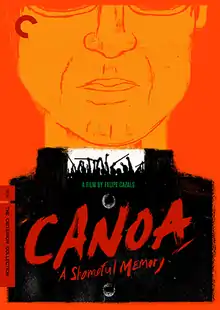Canoa: A Shameful Memory
Canoa: A Shameful Memory (Spanish: Canoa: memoria de un hecho vergonzoso) is a 1976 Mexican drama film directed by Felipe Cazals, based upon the San Miguel Canoa Massacre.[1]
| Canoa: A Shameful Memory | |
|---|---|
 Criterion Collection DVD cover | |
| Directed by | Felipe Cazals |
| Produced by | Roberto Lozoya |
| Written by | Tomás Pérez Turrent |
| Starring | Arturo Alegro |
| Cinematography | Álex Phillips Jr. |
| Edited by | Rafael Ceballos |
Release date |
|
Running time | 115 minutes |
| Country | Mexico |
| Language | Spanish |
Plot
The film is a dramatic re-enactment of real-life events that took place in 1968 in the small village of San Miguel Canoa in Puebla, México. There a group of five young employees of the Autonomous University of Puebla intended to spend the night en route to a hike up La Malinche. The group was viciously set upon by villagers who had been manipulated by a local right-wing priest to believe them to be Communist revolutionaries and deserved lynching.
The film is shot in a documentary style and examines the pervasive atmosphere of repression in the country following wide-spread protests over the government's spending on the 1968 Summer Olympics, eventually leading to a massacre of hundreds of protestors in Mexico City.
Cast
- Enrique Lucero as Priest
- Salvador Sánchez as Witness
- Ernesto Gómez Cruz as Lucas
- Roberto Sosa as Julián
- Jaime Garza as Roberto
- Arturo Alegro as Ramón
- Carlos Chávez as Miguel
- Gerardo Vigil as Jesús Carrillo Sánchez
- Manuel Ojeda as Town man
Release
It was one of the first movies to express the tone of the time of the setting: Mexico 1968, when student turmoils were spread across the country. It was entered into the 26th Berlin International Film Festival, where it won the Silver Bear - Special Jury Prize.[2]
Reception
The film was both a critical and a box-office success.[3] Mexican filmmakers Guillermo del Toro and Alfonso Cuarón have praised the film.[4]
References
- "Canoa: memoria de un hecho vergonzoso". www.filmografiamexicana.unam.mx. Retrieved 16 November 2015.
- "Berlinale 1976: Prize Winners". berlinale.de. Retrieved 16 July 2010.
- "Canoa: A Shameful Memory: The Devil in Disguise". The Criterion Collection. Retrieved 2 August 2018.
- "'Canoa: A Shameful Memory' is shamelessly enticing". 27 April 2017. Retrieved 2 August 2018.
External links
- Canoa: A Shameful Memory at IMDb
- Canoa: A Shameful Memory: The Devil in Disguise an essay by Fernanda Solórzano at the Criterion Collection